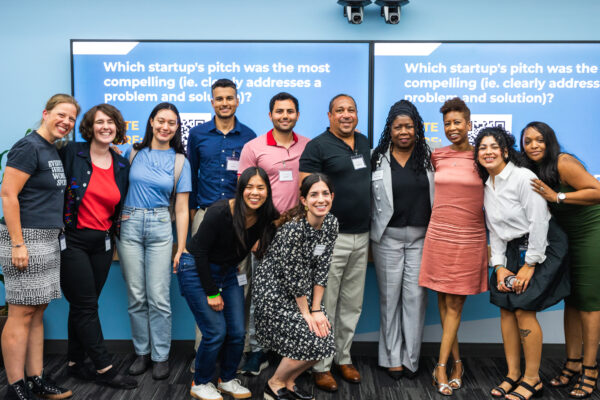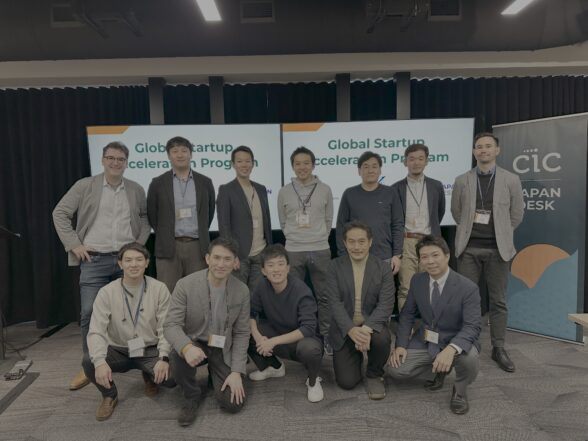Every year, the Boston startup community comes together for an incredible week-long experience. Attendees connect, learn, and celebrate progression and innovation with fellow entrepreneurs through more than 60 events, hosted by over 195 speakers and spread out over five days. Whether you’re looking for an investment or advice on how to get started, there’s a little bit of something for everyone at Startup Boston Week.
CIC was thrilled to host over 50 events at Startup Boston 2019, where over 2,800 attendees and entrepreneurs hear from speakers and panelists covering a range of topics from community building to networking, mentorship, and the power of persistence. If you couldn’t attend yourself, that’s okay! We’ve got the recap of key insights from this jam-packed week.
How to Build a Growth Company for Free in Boston
Entrepreneurs face many of the same struggles when trying to get their startups off the ground. You’re not as alone as you think, and that was the goal of the “How to Build a Growth Company for Free in Boston” panel.
Moderating the discussion was Colin Greenhalgh, the regional senior vice president of Truss, a marketplace that helps small businesses and startups find and lease office space. The panel took a deep dive into advice from four field experts for getting your startup off the ground.
- Janice Dru, senior marketing director at CIC
- Peter Maglathlin, cofounder and CFO of Trade Hounds
- Bobbie Carlton, founder of Innovation Nights and Innovation Women
- Chase Garbarino, cofounder and CEO of HQO
Below, we’ve collected a few short snippets of our favorite advice. You can also view some of clips from the panel on YouTube:
- Create an environment for partnership
- Develop a team who won’t give up
- Become persistent
- Create structured mentorships
- Pay your team in more than equity
- Create a mission-oriented startup
- Turn a solution into a business
- Network more effectively
How Can You Effectively Network?
First, networking is about passion. “You have to be authentically passionate about what you’re doing,” said Peter Maglathlin. He went on to say that if you are an entrepreneur and have a product or service that can help people, they’ll get fired up about it, and your passion will
become contagious. With shared passion driving your company, you’ll likely be able to attract more talent and increase your chances for success.
Another great way to effectively network is to help others, said Bobbie Carlton. By helping others, you’re opening up opportunities for them to return the favor in the future, even years down the line. That’s what has happened for Innovation Nights. The organization has been able to gain millions of impressions online and offline, just by working closely with individuals they’d already connected with in the past.
The Power of Persistence
Remember, there is a fine line between persistence and creepiness, explained Chase Garbarino. Yes, networking and fundraising is a numbers game. One yes can make up for 50 nos, but pushing too hard can have the wrong effect. Be sure to use basic business etiquette — please and thank you — and to keep pushing politely.
A great example came from Maglathlin when he was first trying to fundraise for Trade Hounds. He and his cofounders didn’t know what they were doing when they headed to Silicon Valley, and it showed. They were told no dozens of times over five days until finally, one person said yes, but they still didn’t have the entire investment they needed.
So, they decided to be scrappy, creative, and refuse to give up. That’s how they ended up cold-emailing Mark Cuban to see if he would be interested in investing. Surprisingly, he was, and a few weeks later, they had the commitment of funds the entrepreneurs needed. “We never would have gotten there had we been discouraged by all the nos,” said Peter.
Equity as a Payment is Not Enough
Company dynamics are changing. No longer is the shareholder the end-all, be-all. Now, more and more companies are focused on their mission and vision, answering the question, “Can we make a difference in the world today?”
A vision statement is essential for a startup, Carlton said. And you need to find people who share that vision to work with you. However, that doesn’t mean that they shouldn’t be fairly compensated for joining you, and equity is not enough. People have bills, and if they are only offered equity, not only are their desires on the lowest end of the priority list, but they won’t have the incentive to keep giving to your company.
Create Structured Mentorships
Finding mentors and advisors can also help entrepreneurs grow their companies. Being a mentor or advisor can also help with growth and visibility. You can choose to mentor others on your team as part of your leadership and development goals, and share your expertise and experiences with individuals outside your company in mutually beneficial mentoring relationships.
“If there is a specific skill set you’re looking to build or there is a goal that will take regular feedback, I like to create a structured mentorship,” said Janice Dru. The key is to place the structure in the mentee’s hands. It’s up to you as the mentee to come up with meeting agendas and goals to work through on a regular basis. Then, when that structured mentor relationship is no longer needed, the relationship can shift into more of an advisory role.
The Benefits of Having a Collaborative Office Space
“You need time and resources to build anything, and oftentimes, that’s about finding the right people to partner with you and support you on your journey,” said Janice Dru. The truth is that it takes a lot to get a startup off the ground, but with help, it’s possible. And that requires the right type of environment that allows people to meet who they’re looking to meet.
At CIC, that’s exactly what you have—a shared office environment with coworking spaces where serendipitous situations can occur at any time and innovation is always present. The goal of CIC is to create an open environment where you can meet people you wouldn’t otherwise meet and who have the same goals as you. This creates a trusting and respectful environment with people and fellow entrepreneurs who can help you get through the tough times and cheer you on during the good times.




